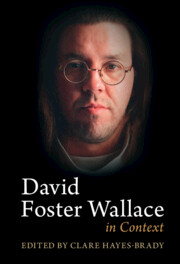Book contents
- David Foster Wallace in Context
- David Foster Wallace in Context
- Copyright page
- Contents
- Figures
- Contributors
- Acknowledgments
- Abbreviations
- Introduction
- Part I Contexts
- Part II Ideas
- Chapter 10 David Foster Wallace and Attention
- Chapter 11 After Analysis
- Chapter 12 Perfectionism and the Ethics of Failure
- Chapter 13 The Pragmatist Possibility in David Foster Wallace’s Writings
- Chapter 14 A Tale of Two Theses
- Chapter 15 Free Will and Determinism
- Chapter 16 David Foster Wallace’s Mathematics of the Infinite
- Chapter 17 David Foster Wallace and Existentialism
- Chapter 18 David Foster Wallace and Religion
- Chapter 19 Mr. Consciousness
- Part III Bodies
- Part IV Systems
- Works by David Foster Wallace
- Bibliography of Secondary Sources
- Index
Chapter 14 - A Tale of Two Theses
System J and The Broom of the System
from Part II - Ideas
Published online by Cambridge University Press: 18 November 2022
- David Foster Wallace in Context
- David Foster Wallace in Context
- Copyright page
- Contents
- Figures
- Contributors
- Acknowledgments
- Abbreviations
- Introduction
- Part I Contexts
- Part II Ideas
- Chapter 10 David Foster Wallace and Attention
- Chapter 11 After Analysis
- Chapter 12 Perfectionism and the Ethics of Failure
- Chapter 13 The Pragmatist Possibility in David Foster Wallace’s Writings
- Chapter 14 A Tale of Two Theses
- Chapter 15 Free Will and Determinism
- Chapter 16 David Foster Wallace’s Mathematics of the Infinite
- Chapter 17 David Foster Wallace and Existentialism
- Chapter 18 David Foster Wallace and Religion
- Chapter 19 Mr. Consciousness
- Part III Bodies
- Part IV Systems
- Works by David Foster Wallace
- Bibliography of Secondary Sources
- Index
Summary
The influence of Wittgenstein on Wallace has become a truism in the scholarship. This chapter explores the contribution of the philosopher and logician to Wallace’s fiction writing, focusing on the logical questions that are most directly present in the fiction. More particularly, the chapter offers a provocative look at Wallace’s philosophical entanglement with Richard Taylor and ideas of fatalism. Imagining an alternate world in which Wallace was a philosopher by profession instead of an author, the chapter traces the development of his argument against Taylor’s proposition by way of logic, one of the key philosophical features of his writing, and traces a path from here to the interest in Wittgenstein and language games that dominated his fiction. In imagining this alternative world, the chapter invites the reader to think through exactly the ideas of choice, contingency, language and logic that animate argument it discusses.
- Type
- Chapter
- Information
- David Foster Wallace in Context , pp. 149 - 158Publisher: Cambridge University PressPrint publication year: 2022

